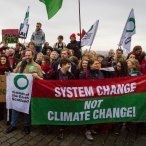English · Español

21 December 2015 | Interviews | UN Climate Change COP 21 | Resisting neoliberalism | Gender | Climate Justice and Energy
Rafael Freire, of the Trade Union Confederation of the Americas and Martin Drago, of Friends of the Earth, speak at the COP in Paris
“I don´t think it is possible to win the battle of climate change if we don´t address the development model. I mean, when we discuss about climate change, we are talking about how the world works. And today, this has to do especially with the power exerted by transnational corporations on many governments, imposing their own game rules”.
This was the beginning of the presentation by Sustainable Development and Economic Policy Secretary of the Trade Union Confederation of the Americas (TUCA), Rafael Freire, at the debate titled “Trade Unions and Social Movements: challenges and alliance perspectives against climate change” held on December 4 in Paris, France.
This was held in the framework of the activities parallel to the United Nations COP 21 on Climate Change with the support of the International Trade Union Confederation (ITUC). The debate was also part of the “Trade Union Forum on Climate” held as part of the space defined by the United Nations for the civil society called “Climate Generations”.
Freire highlighted that “the trade union movement alone does not have sufficient strength at world level to fight for another development model, even an environmental and energy sustainability model”. “We need to build important alliances to build a process”, he added, “not organize events”. “We face the challenge to implement a type of union action with other social movements that is strong enough to discuss another development model”, he highlighted.
Meanwhile, environmental activist Martin Drago, of Friends of the Earth Latin America and the Caribbean (ATALC) also coordinator of the Food Sovereignty Program of Friends of the Earth International, focused his presentation on the alliance-building work of Latin American social movements.
“For us it is key that we recognize who the main subjects of change are (…). At least in our Latin America and the Caribbean, the key subjects of change are trade union organizations, peasant organizations, indigenous organizations and women organizations”, said Drago. “And I´d like to highlight the issue of organization. These are not isolated peasants, or workers or women, but they are organized, articulated. Organization is key in order to move forward”, he said.
Imagen: https://www.flickr.com/photos/foei







